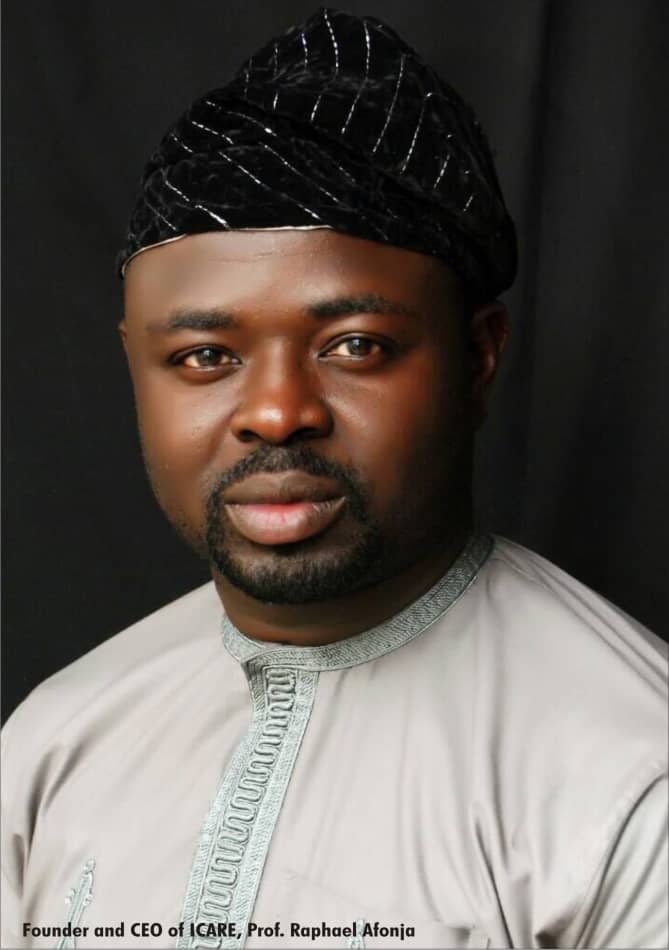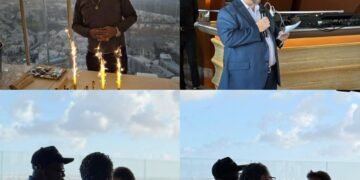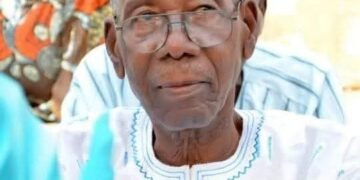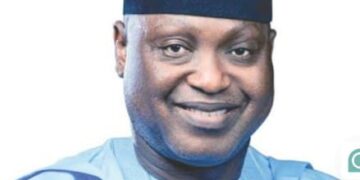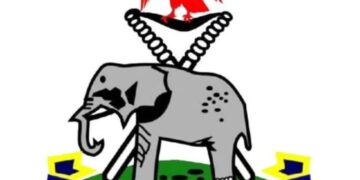The Editor, FEMI OGUNLANA in this piece examines the activities of an American-based university don, Professor Raphael Afonja in adding value to the society through several empowerment programmes in various communities in Ogbomoso.
Africa is a continent negligent of its citizens, ever treating its citizens’ welfare with inexplicable levity. Infrastructures are in a deprecating state of decay; qualitative education is a mirage; healthcare delivery is in shambles; poverty stalks the land, with acute rareness of food biting most excruciatingly. Life here is appalling because governments shirk their responsibilities and are not civic-minded.

Corruption, incompetence, cluelessness and such flippant attitudes are invariably the bane of Africa’s evolution into a state of Eldorado and greatness. Nigeria isn’t an exception as these indices of underdevelopment are visibly manifest. Nigeria getting ranked last year as the poverty capital of the world and bagging such other ignoble rankings speak much of the devastation ravaging the land. The saving grace however is that there are individuals whose drive to care and share smiles shoots way beyond the ordinary. These individuals courageously stand in the gap, they dip deeply into their coffers to dish out their hard-earned monies to assisting the less-privileged. They do what governments fail to do, or to be benevolent, complement governments.

One such individual who has allowed the milk of human kindness to flow forth from him is Professor Raphael Afonja, who currently teaches at Southern New Hampshire University and at the Department of Physical Sciences, Kingsborough Community College (KCC) both in USA. He is also a visiting Professor at SOWELA Technical Community College, School of Industrial Technology (where he had served as Dean) and at the University of North Dakota, Grand Forks, ND.
Afonja, whose rise to the enviable station he occupies today was a tremendous battle of wits with the elements and against terrific odds has demonstrated immense passion in this uncommon task of caring for the poor and contributing to the society. Though hewn in an atmosphere crammed with hostility, he was never discouraged; this harsh background has rather become the fuel that drives his eleemosynary gestures. Unlike many who would become hostile in the spirit of revenge against a society that subjected them to hardship, he receives motivation from it to be compassionate thereby contributing meaningfully to uplifting the less-privileged.

In a periodical published by KCC, where he teaches, Dr. Afonja notes, “As someone who was once homeless and hungry most of the time, I shaped my thinking and drive around empathy for people. Our organization believes in a world in which every child has access to quality education, communities are empowered, and everybody is treated equally and with respect.”
Afonja pursued his dream of assisting the less-privileged through a non-profit organization he founded and is funding – ICARE, an acronym for Innovative Community Assistance to Restore and Empower. The organization founded few years ago has been providing resources to the less privileged, strengthening communities through education, school infrastructure, healthcare, and economic empowerment. Specifically, ICARE focuses on women empowerment, education, healthcare and food banks.
Brief background
Raphael Afonja, PhD, COREN Reg. Engr., M.ASCE, M.NSE, REP, CEP, CESCO, born in Ogbomoso some years ago travelled to the United States of America in a bold move relying on God and himself for sustenance. He read and toiled to reach the peak of academic attainment. He holds two first degrees – B.Sc. Engineering Science (Mechanical Engineering) and B.Sc. Theoretical and Mathematical Physics as well as M.Sc. Environmental Science, all from The City University of New York, USA. Subsequently, he bagged PhD in Engineering (Civil Engineering), from the University of North Dakota. He also holds PhD Studies in Information Studies, Long Island University, and was awarded Distinguished Honor Graduate U.S. Army Quartermaster School.
A thoroughbred professional, he is both a Registered Civil Engineer and a Registered Environmental Professional. He has also undertaken courses in Environmental Impact Analysis Process, Environmental Contracting, at the U.S. Air Force Institute of Technology, Facilities Engineering  Level I & Level II, Six Sigma Training, at the Defense Acquisition University and OSHA 40-hours HAZWOPER Certification, 360Training school.
Level I & Level II, Six Sigma Training, at the Defense Acquisition University and OSHA 40-hours HAZWOPER Certification, 360Training school.
Between 2013 and 2018, he was a Senior Consultant at Gamut Engineering and Technology Services (GETS) and has served as Environmental Program Manager/Environmental Engineer for the United States Air Force, 27th Special Operations Civil Engineering Squadron.
‘Caring is sharing through ICARE’: Prof Afonja’s remarkable initiative
Dr Afonja did not have it rosy at the beginning of his struggle to achieving his dream, he faced debilitating challenges but this only served to strengthen his resolve to reach his goal; for a man of lesser character the challenges would have done him in. This laid the foundation for his present caring and sharing engagement. When he first arrived in America, “he worked at three jobs, as a paper deliveryman, security guard, and washing dishes in a restaurant to pay for his tuition and completing two degrees,” noted KCC magazine.

But then, he lost “two of his three jobs and becoming homeless, he considered dropping out of school because he could not afford to pay his tuition. After approaching his then Professor, and current boss Dr. John Mikalopas, to tell him he would not be attending school for that semester, Dr. Mikalopas helped him pay for his classes,” KCC magazine further informs.
The periodical also states, “After graduating from KCC, he took off to work as a truck driver, driving cross country to save up enough money to continue his education. He went on to complete his Bachelors and Masters degrees at College of Staten Island before returning to teach at Kingsborough Community College. Dr. Afonja received his Ph.D. in Civil Engineering from the University of North Dakota.”
A civic-minded individual at heart and with passion for politics, Afonja in a telephone chat with The Insight stresses while giving the focus for his organization, “Our mission focuses on providing resources to the less-privileged people by strengthening them through healthcare, education, community empowerment and putting in place mechanisms that will help eradicate hunger in these communities.”
He added, “A recent study shows that 85-90% of African families live on less than 26 US dollars a month, which means that these families cannot afford to send their kids to good schools and earn quality education.
“They cannot afford to pay for medical services, they cannot afford to put food on their table and they cannot afford to start a new business or grow their existing businesses. That is why we as an organization have put in place solutions and long term goals to bring people out of their challenges.
“We also believe as an organization that every child must have access to quality education, community must be empowered, and we believe that everybody should be treated equally.”
Borne by this altruistic object, he decided to contribute his quota to assisting the less-privileged, and has been committing a lot of resources to meeting these demands, “I have been running a non-profit organization for the past few years. It is solely financed by me by God’s grace.”
Through ICARE, he has done a lot, he has cared and shared among the people, which have been commended by those who know and above all by the many beneficiaries of the programmes.
Also speaking with The Insight, coordinator of Afonja Foundation’s programmes, Mr. Banji Oyelowo confirmed the many interventions of ICARE. He stressed Dr Afonja funds all the programmes praying effusively that God will continue to move him forward and enable him achieve his dreams.
ICARE programmes in numbers
Sharing through women empowerment and food bank
The primary programme of the non-profit organization is women empowerment. It considers this as a way out of the acute poverty assailing the people. “Women empowerment is our primary programme. We take as important security for the aged whereby we give them food items. We partner local farmers through whom we get tomatoes, peppers, vegetables and other things which we give to the aged.”
The activities of the organization include capital to women to help their businesses, which is a minimum of N30, 000 based on the business type. In the last one year alone, nothing less than 60 to 70 women have benefited the largesse. Aside giving the women money, they give them financial training, how to manage their business and money, how to turn N5 to N10, and other businesses they can engage in.
“A good example is a lady I met, she sells popcorn,” Dr. Afonja posits, adding, “she would buy ororo (groundnut oil) on credit which means she would pay extra when she is to pay, by the time we gave her our capital, she started to buy in gallons.
“I know other people that take LAPO loans, the interest kills them, they can’t even make profit from what they do because they divert all their gains to pay the interest, so we get them involved by giving them money to start businesses. They meet with our people every week for the training and we mentor them,” Afonja discloses.
The Insight further learnt that it was not only women that are being assisted, the elderly persons too are a target. The welfare of the aged and citizens generally is paramount to ICARE which it promotes through its food bank initiative. This is a kind of reserve of different raw food items from which the needy are given. The organization achieves this by partnering farmers to purchase food items in bulk just as it obtains processed foods from wholesalers.
This ensures a continuous supply of food items to the needy, at least those captured by the organization by which means it attempts to eradicate hunger. Not relenting, it constantly expands on its food bank network in the various communities, adding, “to allow senior citizens and families with children who are struggling to put food on the table come and collect raw food and in some cases meal when they lack food.
“And, by partnering with farmers to obtain food items we would have contributed to their economic liberation,” it is emphasized.
“There are farmers who have farm produce which they aren’t able to sell, so we partner them, we buy from them and distribute to the elderly people, we do go to communities to give rice, semovita, beverages etc.”
Reiterating the rationale for this, Afonja said the organization realized various governments often pay lip service to citizens’ welfare and so took it upon itself to contribute the little it could do in order to alleviate people’s suffering.
“This is because citizens’ welfare is one of the weakest points of the Nigerian government. Welfare is low, our people are suffering, and especially the elderly who are yet to be given pensions, these are vulnerable as most times their children are not around. This is one of the things we do on daily basis.”
In addition, coordinator of ICARE, Oyelowo by his disclosure affirmed that the organization awards a loan of up N50, 000 or more to women in order to empower them. “We give them money as much as N100, 000 for them to start businesses or expand. It is a kind of revolving loan which however attracts no interest, repayment period is six months minimum,” submitted Oyelowo while adding, “We meet every Wednesday with these women to discuss with them, give them training, review the programme and those who want loan indicate interest.
“At each meeting, about 40 to 50 women often attend,” while also mentioning, “We give the aged food especially those who can’t go out again and the needy generally, we give them semovita, rice, milk, bournvita and so on.”
Sharing via education
ICARE’s concern with quality education cannot be overemphasized. Afonja submits, “Let me briefly talk about education and our experience. We found out that most of those children from poor background attend public schools that are less funded by the government. These public schools lack infrastructure and facilities that would have helped these children to grow and learn in a conducive environment.”
Hence, the organization’s activities include provision of infrastructures in schools, it last year renovated blocks of classrooms at Adeniran Memorial Grammar School (AMGS), Ogbomoso. Also, it copiously engages in payment of school fees to alleviate students’ plight.
This education intervention it extends to university students too. At the Ladoke Akintola University of Technology (LAUTECH) many indigenes of Ogbomoso and environs have been assisted and supported.
“Some of the classrooms we have worked on in the past lacked ceilings; some have partial roofs and due to poor maintenance some do not have any roof at all. What we have done in the last one year is to go to each school, fix up their classrooms, provide chairs and tables for the children and also provide blackboards.
“We also found out that most of these schools lack libraries and science laboratories, they don’t have earth science labs, we also found out that most of these children have not seen or touched computers which are a setback when compared to their peers across the globe.”
He adds, “We believe as an organization that every child must have access to quality education.”
Oyelowo similarly informed, “We pay NECO fees of blind students, this can be confirmed at the Blind Centre or at AMGS. We also give stipends to them monthly.”
ICARE is waxing stronger in meeting these needs as its team of volunteers identifies them; many schools and students/pupils have felt its impact in the last few years even as it poises to do more.
Sharing through healthcare
Unless their target people are healthy, it is crystal clear that the goal of the organization will be roundly defeated. Thus, ICARE pays much attention to healthcare delivery to complement government’s efforts. It organizes medical outreaches regularly the last of which was attended by not less than 3, 000 people. Furthermore, the organization creates awareness on healthcare, distributes treated mosquito nets, offsets hospital bills, and takes care of sick people.
Dr. Afonja states, “We found out that a lot of families do not have the money to pay for quality health services, that is why we had about 3,000 people showing up for our last medical outreach, they came for testing and also to get medication for some of the illnesses that we have found out they were dealing with.
“In addition on our health intervention, they say “health is wealth,” if we give women money and they are sick their business cannot thrive. So, we do much of medical outreach, we involve them, we help them with medical care, we do medical outreach every three months, in-house and community-based.”
An astute researcher, he ensures that their activities are decided based on results of empirical studies as he further notes: “We also found out that most part of Africa are prone to malaria, tuberculosis, typhoid and HIV. So, we will continue to go out to those communities to do more testing and making sure that we educate those people by medical awareness.
“Our future plan is to partner with the hospitals in these communities, whereby we pay all or some of these medical bills so that people can actually go to these hospitals.”
In his submission likewise, Coordinator Oyelowo explained that the foundation carries out eye tests and continuously offers free medical care to the people, attesting to the fact that their medical outreach comes up every three months.
Professor Afonja on leadership
After years of practical experience in leadership in both academic and professional worlds and based on his exigent background, Afonja has come to identify leadership with empathy.
“I believe one most important quality any leader in any society must have is empathy. A leader that lacks empathy will be a failed leader. You must have empathy towards the people if you seek to lead, and that is what motivates our programme, our pro-poor programme.
“I call it poor programme, because the programmes overlap, if we do one and do not do others, it will not be effective. As an instance, in women empowerment, if the woman you are empowering is not healthy, she can’t be successful, so these interventions are important.”
Striving more in caring and sharing
He underlines, “Lastly, a strong community needs empowerment. We believe that if we give capitals to families – women, youths – that allow them to study new businesses or grow their existing businesses, without vocational skills, the purpose of giving them capital is defeated.
“Our plan as an organization is to invest in skill acquisition, that is vocational skills, financial training programme that will help these people to sustain their businesses. These four programmes we have engaged in, in the past four years, we want to grow them.”
Oyelowo added that later in the year, the organization would expand its scope as it plans to give out empowerment items such as motor cycles for commercial purposes, taxicabs, deep freezers etc as well as lend money to entrepreneurs who plan on erecting structures for their business.


